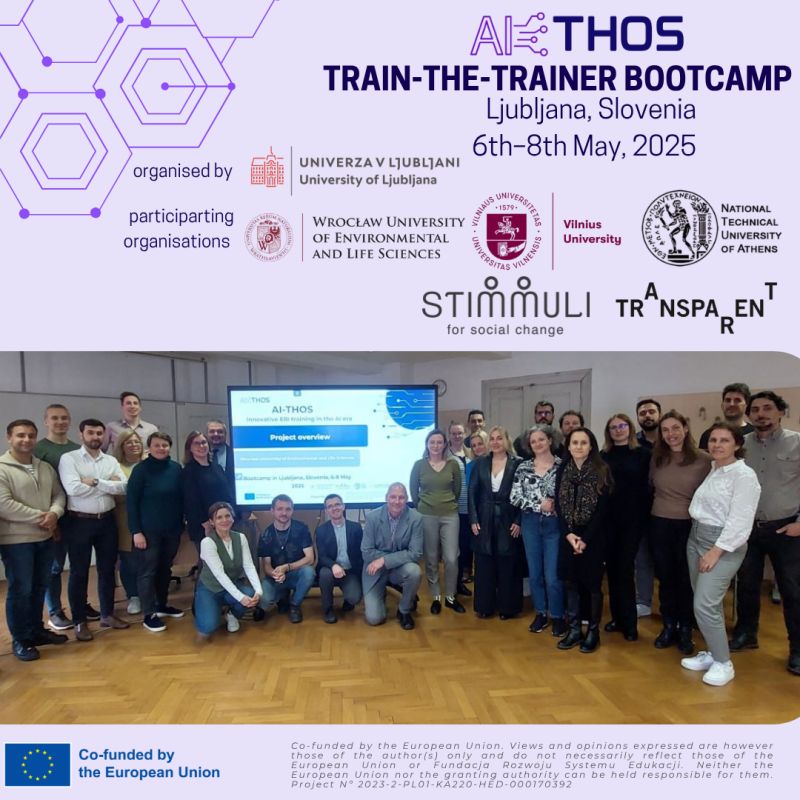 On Tuesday, 9 December 2025, in Brussels, the comprehensive policy report titled “Making the EU’s 2028–2034 Multiannual Financial Framework Work for Southern Europe.”, prepared by the PromethEUs network, was presented.
On Tuesday, 9 December 2025, in Brussels, the comprehensive policy report titled “Making the EU’s 2028–2034 Multiannual Financial Framework Work for Southern Europe.”, prepared by the PromethEUs network, was presented.
The report assesses the European Commission’s proposal for the 2028–2034 Multiannual Financial Framework (MFF) and its implications for Southern Europe, focusing on two key instruments: the European Competitiveness Fund and Horizon Europe. The presentation was attended by policy makers, representatives of industrial associations, and think-tank groups from various countries, who provided comments on the report’s findings.
Aggelos Tsakanikas, Director of the Laboratory of Industrial and Energy Economics (LIEE), presented the chapter he co-authored with Dr. Petros Dimas on the impact of previous HorizonEU programmes on SMEs in Southern Europe, with a particular emphasis on their digital footprint. The report also includes policy recommendations for the tools currently being developed.
Further details about the report and the event can be found here
The full report is available here
PromethEUs Conference | SIMPLIFY TO COMPETE: Rethinking EU Regulation for a Digital Future
 On July 2, 2025, PromethEUs convened a closed event in Brussels at the European Parliament offices, bringing together policymakers, experts and stakeholders for the conference “SIMPLIFICATION FOR COMPETITIVENESS: Redefining EU legislation for a digital future.”
On July 2, 2025, PromethEUs convened a closed event in Brussels at the European Parliament offices, bringing together policymakers, experts and stakeholders for the conference “SIMPLIFICATION FOR COMPETITIVENESS: Redefining EU legislation for a digital future.”
Hosting MEP Antonio López-Istúriz White (AFET) opened the event, arguing that clear, balanced regulations—paired with stakeholder input and strong oversight—must streamline rules, ensure interoperability, and shield global supply chains.
The floor then passed to Stefano da Empoli, President of I-Com, and Professor Steffen Hoernig (Nova School of Business & Economics / IPP-Lisbon), who unveiled PromethEUs’ new publication.
Following this presentation, Serge Le Gal, Horizontal Coordinator for Better Regulation at the European Commission, delivered a keynote focusing on the Commission’s strategy to streamline the legislative framework based on 4 pillars – effectiveness, simplicity, better law making and cooperation.
 A moderated discussion led by Aggelos Tsakanikas (Director, LIEE) showcased perspectives from three Members of the European Parliament: Jonás Fernández Álvarez (ECON), Pablo Arias Echeverría (IMCO) and Mariateresa Vivaldini (ITRE).
A moderated discussion led by Aggelos Tsakanikas (Director, LIEE) showcased perspectives from three Members of the European Parliament: Jonás Fernández Álvarez (ECON), Pablo Arias Echeverría (IMCO) and Mariateresa Vivaldini (ITRE).
The conversation broadened with a tour-de-table, steered by Darío García de Viedma of the Elcano Royal Institute, that brought together voices from consumers, standards bodies, industry associations and think tanks. Speakers (Euroconsumers; CEN-CENELEC; ITI; Digital SME Alliance; CCIA; Vinces; Euromines) converged on the view that regulatory clarity and strategic investment will decide whether Europe seizes the second half of the Digital Decade.
LIEE report, co-authored by Professor Angelos Tsakanikas and Postdoctoral Researcher Petros Dimas, concerns strategies for semiconductors and quantum technologies.
The report can be found here
The video can be found here
The Laboratory of Industrial & Energy Economics (LIEE-NTUA) proudly participated in the AI-THOS Train-the-Trainer International Bootcamp, held in Ljubljana, Slovenia (6–8 May 2025)—a milestone event advancing ethical, innovative AI integration in higher education.
AI-THOS project aims to train, support and empower teachers of higher education to integrate AI tools in the teaching process in alignment with Ethics & Research Integrity (ERI) principles.
The Bootcamp brought together academic partners from NTUA (Greece), Wroclaw University of Environmental and Life Sciences (Poland), Vilnius University (Lithuania), University of Ljubljana (Slovenia), and other societal partners (Stimmuli for Social Change and Art Transparent) in order to test and fine-tune the AI-THOS Train-the-Trainer programme for HEIs teaching staff—designed to support university educators in using AI tools aligned with ERI principles.
During the bootcamp, Aimilia Protogerou (Assistant Professor, LIEE-NTUA) and Panagiotis Panagiotopoulos (Post-doc Researcher, LIEE-NTUA) led a workshop exploring AI-powered teaching methods such as: Problem-Based Learning, Case-Based Learning, Flipped Classroom, Team-Based Learning, Jigsaw Method, Game-Based Learning.
They shared real-world examples based on interviews with university teachers already experimenting with AI tools—discussing both the pedagogical value and ethical challenges.
The workshop sparked a rich, interdisciplinary discussion on responsible AI usage in education—showcasing the importance of collaboration, experimentation, and ethics.
From the side of NTUA, four additional teachers-researchers participated and actively contributed to the Bootcamp’s activities: Giorgos Paraskevopoulos, Associate Researcher on machine learning at the Institute for Speech and Language Processing at “Athena” Research Center, Anna Bougia, Reseacher at the Computer Technology Institute & Press “Diofantus”, Petros Dimas, Post-doc Researcher, LIEE-NTUA, and Theodora Xenidou, Senior Researcher at NTUA.
Next step: The training materials will now be piloted across partner countries through national workshops—bringing AI & ethics to classrooms across Europe.






Interested in expanding your knowledge and contributing to the improvement of a dynamic educational platform? We invite you to participate in the training programme of the EU-NETS project – European Training for Energy Community Managers.
The project aims to develop a professional training programme that equips Energy Community Managers with the necessary competences, skills and competencies. The aim is to optimise the management of Energy Communities in line with the European Qualifications Framework (EQF).
The training programme has been developed by a group of European partners with the aim of promoting innovative skills and knowledge. From Greece, the Laboratory of Industrial and Energy Economics (LIEEO) of the National Technical University of Athens and the company Evditi (https://euditi.gr/) are participating, actively contributing with their expertise and experience.
Link to the educational program platform
Why Join? The programme provides valuable knowledge and tools designed to enhance your skills and understanding of issues critical to the successful operation of Energy Communities.
Your Opinion is Important Your feedback is essential to further improve the EU-NETS platform. At the end of the project, please share your thoughts, suggestions and experiences with us. Your input will directly help to improve the efficiency and usability of the platform for future trainees.
How do you get started? First, we invite you to the web meeting on 9/12/2024 at 10:00 am, where we will present the platform and the thematic modules of the program. Immediately afterwards, you will have the opportunity to complete the training program over a two-week period. At the end, there will be a meeting where you can share your experience and contribute to the improvement of the training program, as well as a short online evaluation questionnaire.
Link to the online meeting 9/12/2024 at 10:00 am
To log in to the meeting, click here
Online meeting agenda
10:00 – 10:15: Presentation of the EU-NETS project
10:15 – 10:45: Presentation of the Training Platform
10:45 – 11:00: Discussion on the process
11:00 – 11:30: Questions
The Industrial and Energy Economics Laboratory (LIEE) of the National Technical University of Athens (NTUA) organized the online event “Unlocking the Potential of Women Entrepreneurs”, which took place within the framework of the global Women Entrepreneurship Week initiative (https://www.montclair.edu/entrepreneur/), on October 24, 2024, from 17:30 to 19:30.
This initiative was launched by the Universities of New Jersey in the USA that deal with entrepreneurship and this year marks its 11th anniversary, with the participation of more than 140 universities internationally, such as Babson, the University of Michigan, Princeton, Cornell, and Georgetown. NTUA and IEWL participated for the 6th consecutive year.
This year’s event focused on female entrepreneurship in Greece, highlighting opportunities and challenges faced by female entrepreneurs, with an emphasis on strengthening and supporting innovative knowledge-intensive ventures in various sectors of the economy.
The event was coordinated by Emilia Protogerou, Assistant Professor at the School of Chemical Engineering, NTUA and member of the EVEO research team.
You can find the event invitation here and the event program here.
You can watch the video of the event here.
